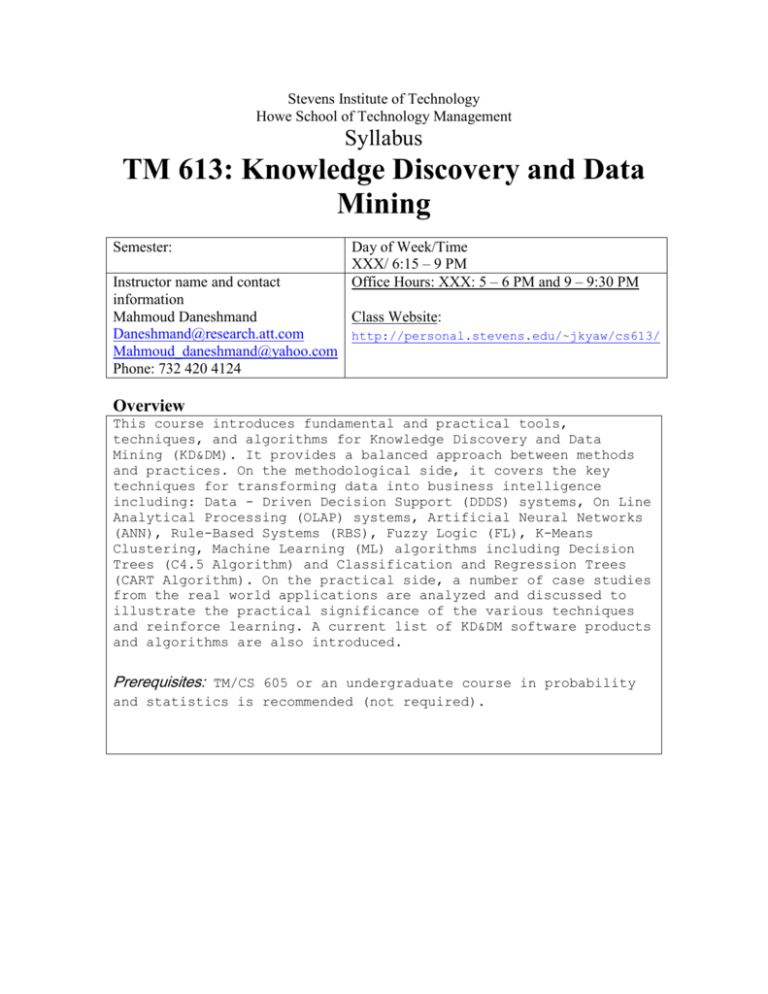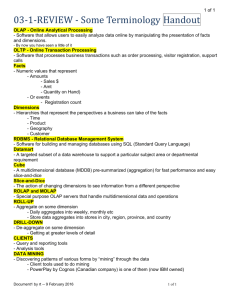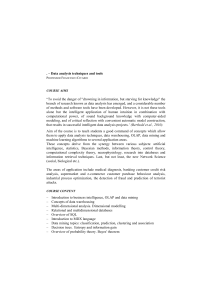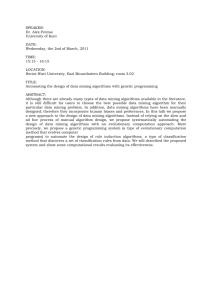Syllabus - Stevens Institute of Technology
advertisement

Stevens Institute of Technology Howe School of Technology Management Syllabus TM 613: Knowledge Discovery and Data Mining Semester: Day of Week/Time XXX/ 6:15 – 9 PM Office Hours: XXX: 5 – 6 PM and 9 – 9:30 PM Instructor name and contact information Mahmoud Daneshmand Class Website: Daneshmand@research.att.com http://personal.stevens.edu/~jkyaw/cs613/ Mahmoud_daneshmand@yahoo.com Phone: 732 420 4124 Overview This course introduces fundamental and practical tools, techniques, and algorithms for Knowledge Discovery and Data Mining (KD&DM). It provides a balanced approach between methods and practices. On the methodological side, it covers the key techniques for transforming data into business intelligence including: Data - Driven Decision Support (DDDS) systems, On Line Analytical Processing (OLAP) systems, Artificial Neural Networks (ANN), Rule-Based Systems (RBS), Fuzzy Logic (FL), K-Means Clustering, Machine Learning (ML) algorithms including Decision Trees (C4.5 Algorithm) and Classification and Regression Trees (CART Algorithm). On the practical side, a number of case studies from the real world applications are analyzed and discussed to illustrate the practical significance of the various techniques and reinforce learning. A current list of KD&DM software products and algorithms are also introduced. Prerequisites: TM/CS 605 or an undergraduate course in probability and statistics is recommended (not required). Introduction to Course Yahoo generates over 10 terabytes of data per day. This is the equivalent of the entire contents of the library of congress. NASA Earth Observing System (EOS) generates 50GB of image data per hour. The explosive growth of many businesses, government, and scientific databases, over the last decade, has far outpaced our ability to extract knowledge from data using the traditional approaches. Advances in data collection technology, such as faster, higher capacity, cheaper storage devices, better data management systems and data warehousing technology has created “mountains” of stored data. The current reality is that technology leaders need to be able to extract knowledge from data a lot faster in order to arrive at timely intelligent decisions. In fact, they need to be provided with the capability of “knowledge retrieval” that matches the speed of thought. These have created a need for a new generation of techniques with the ability to intelligently and automatically assist humans in extracting nuggets of useful knowledge from mountains of data. In recent years, many universities and industries are conducting research on discovering knowledge from data. Computer and communication industry leaders, as well as government agencies have been expanding their data mining & knowledge discovery units to research new methodologies, to develop new tools and applications for faster more efficient data mining. Over the last decade, many tools and techniques have been initiated by a variety of disciplines including computer sciences, statistics, neurology, biology, and engineering. Artificial Intelligence (AI) has glued the underlying disciplines into a new emerging field of Data Mining & Knowledge Discovery (DM&KD) which has generated much excitement and publicity, and has seen significant practical applications. Learning Goals 1: Enable students to recognize a data mining problem and formulate a profound question. 2: Learn how to use information Systems-- Dada-Driven Decision Support Systems, Intelligent Systems; Dimensions of Problems and Solutions - the Stretch Plot Framework 3: Learn and Apply OLAP (On Line Analytical Processing) Systems - 4: Conduct Case Study - OLAP Learn theory and practice of Artificial Neural Network (ANN); Conduct case study 2 5: Learn how to apply Rule-Based Systems (RBS); Fuzzy Logic(FL) 7: Machine Learning (ML) Classification Trees (CT) - ID3, C4.5, and C5.0 Algorithms 8: Classification and Regression Trees (CART) 9: K-Means Clustering 10: design and execute a real world data mining problem, give a presentation, and write a technical paper Pedagogy The objective of this course is to provide the participants with the knowledge and expertise to apply DM&KD techniques to their corporate data and leverage the knowledge to their business. To reinforce application of the tools and techniques, the class lectures are supported with discussion and analysis of many case studies from the industry Required Text(s) Discovering Knowledge in Data, by Daniel T. Larose, John Wiley, 2005 Required Readings Lecture notes, power point presentations, KDNugget, and several up-to-date real world data mining case studies that will be assigned. Additional Readings Journals of data mining and knowledge management Assignments Conduct an end-to-end data mining project: • A Profound Question • Relevant Data 3 • Access the Data • Clean the Data • Integrate the Data • Transform the Data • Mine and Discover • Learn • Make Intelligent Decisions • Present the result and write a possibly publishable paper Assignment Participation Profound question Data and Algorithm Solution, Presentations, and Technical Article Total Grade Grade Percent 10% 20% 20% 50% 100% 4 Ethical Conduct The following statement is printed in the Stevens Graduate Catalog and applies to all students taking Stevens courses, on and off campus. “Cheating during in-class tests or take-home examinations or homework is, of course, illegal and immoral. A Graduate Academic Evaluation Board exists to investigate academic improprieties, conduct hearings, and determine any necessary actions. The term ‘academic impropriety’ is meant to include, but is not limited to, cheating on homework, during in-class or take home examinations and plagiarism.“ Consequences of academic impropriety are severe, ranging from receiving an “F” in a course, to a warning from the Dean of the Graduate School, which becomes a part of the permanent student record, to expulsion. Reference: The Graduate Student Handbook, Academic Year 2003-2004 Stevens Institute of Technology, page 10. Consistent with the above statements, all homework exercises, tests and exams that are designated as individual assignments MUST contain the following signed statement before they can be accepted for grading. ____________________________________________________________________ I pledge on my honor that I have not given or received any unauthorized assistance on this assignment/examination. I further pledge that I have not copied any material from a book, article, the Internet or any other source except where I have expressly cited the source. Signature ________________ Date: _____________ Please note that assignments in this class may be submitted to www.turnitin.com, a webbased anti-plagiarism system, for an evaluation of their originality. 5 Course Schedule (can follow instructor’s own style) 6






